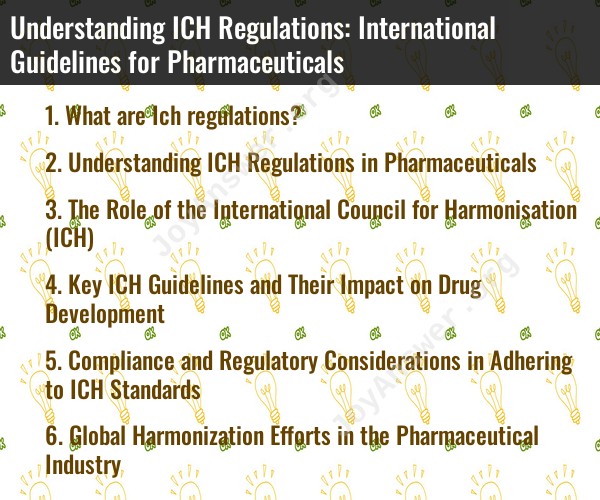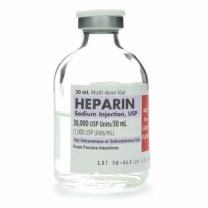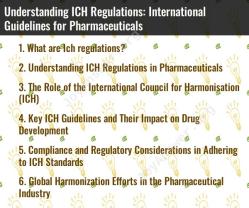What are Ich regulations?
ICH, or the International Council for Harmonisation of Technical Requirements for Pharmaceuticals for Human Use, is an organization that develops and promotes international guidelines and regulations for the pharmaceutical industry. ICH guidelines aim to harmonize and standardize the requirements for the development, testing, registration, and post-approval of pharmaceutical products. These guidelines facilitate the global registration of pharmaceuticals and ensure that they are safe, effective, and of high quality. The key objectives of ICH regulations are as follows:
Quality: ICH guidelines help ensure the quality of pharmaceutical products by setting standards for the manufacturing, testing, and control of pharmaceutical ingredients and finished products. This includes guidelines for Good Manufacturing Practice (GMP) and Quality Risk Management.
Safety: ICH regulations provide guidelines for assessing the safety of pharmaceutical products, including non-clinical and clinical safety testing. This helps in identifying potential risks and minimizing harm to patients.
Efficacy: ICH guidelines establish criteria for the design and conduct of clinical trials, as well as the assessment of clinical data to determine the efficacy of pharmaceutical products. This includes guidelines for clinical trial design, statistical analysis, and the use of biomarkers.
Multiregional and Global Harmonization: ICH promotes the harmonization of regulatory requirements across different regions of the world. This makes it easier for pharmaceutical companies to develop and register their products in multiple countries without the need to meet vastly different regulatory standards.
Efficiency: By creating standardized guidelines, ICH helps streamline the drug development and registration process. This can reduce the time and resources required for bringing new medicines to market.
Key ICH guidelines include:
ICH Q1-Q12: These guidelines cover topics such as stability testing, impurities, quality risk management, and pharmaceutical development.
ICH E1-E19: These guidelines focus on various aspects of clinical safety and efficacy, including the design of clinical trials, statistical principles, and post-approval safety reporting.
ICH M1-M7: These guidelines address regulatory requirements related to the quality, non-clinical, and clinical aspects of medicinal products.
ICH S1-S9: These guidelines pertain to the safety assessment of pharmaceuticals and cover topics like genotoxicity, carcinogenicity, and the use of biomarkers in safety testing.
It's important to note that while ICH guidelines are widely adopted and followed in many countries, they are not legally binding regulations themselves. Instead, they serve as recommendations that individual regulatory authorities may incorporate into their own legal and regulatory frameworks. Pharmaceutical companies typically use ICH guidelines as a reference when developing and registering new drugs to ensure compliance with global standards.
Understanding ICH Regulations in Pharmaceuticals
ICH regulations are a set of international technical requirements for pharmaceuticals for human use. They are developed by the International Council for Harmonisation (ICH), a tripartite organization consisting of regulatory authorities from the European Union, Japan, and the United States, as well as representatives from the pharmaceutical industry.
ICH regulations are designed to ensure that pharmaceuticals are safe, effective, and of high quality. They cover a wide range of topics, including non-clinical and clinical testing, manufacturing, and quality control.
The Role of the International Council for Harmonisation (ICH)
The International Council for Harmonisation (ICH) was established in 1990 to harmonize the technical requirements for pharmaceuticals for human use among the European Union, Japan, and the United States. This was done to reduce the costs and time associated with drug development, and to facilitate the global registration of new drugs.
ICH has developed a number of guidelines that are now widely used by the pharmaceutical industry and regulatory authorities around the world. These guidelines cover a wide range of topics, including:
- Non-clinical testing
- Clinical trials
- Manufacturing
- Quality control
- Good clinical practice (GCP)
- Good manufacturing practice (GMP)
Key ICH Guidelines and Their Impact on Drug Development
Some of the key ICH guidelines and their impact on drug development include:
- ICH E6: Good Clinical Practice (GCP) - ICH E6 provides guidance on the ethical design, conduct, and reporting of clinical trials. This guideline has helped to improve the quality and reliability of clinical trials, and has made it easier for companies to register drugs in multiple markets.
- ICH E7: Good Manufacturing Practice (GMP) - ICH E7 provides guidance on the GMP that should be followed in the manufacture of pharmaceuticals. This guideline helps to ensure that pharmaceuticals are manufactured consistently and to a high standard of quality.
- ICH S1B: Testing for Carcinogenicity of Pharmaceuticals - ICH S1B provides guidance on the non-clinical testing that should be performed to assess the carcinogenic potential of pharmaceuticals. This guideline has helped to improve the safety of pharmaceuticals, and has made it easier for companies to register drugs in multiple markets.
Compliance and Regulatory Considerations in Adhering to ICH Standards
Companies that develop and manufacture pharmaceuticals are required to comply with the ICH regulations in the markets where they wish to register their products. Regulatory authorities in these markets will inspect companies' facilities and review their documentation to ensure that they are in compliance with the ICH regulations.
Companies that adhere to ICH standards can benefit from a number of advantages, including:
- Reduced time and costs associated with drug development
- Easier registration of drugs in multiple markets
- Improved reputation for quality and safety
Global Harmonization Efforts in the Pharmaceutical Industry
In addition to the ICH, there are a number of other organizations that are working to harmonize the technical requirements for pharmaceuticals around the world. These organizations include:
- The World Health Organization (WHO)
- The Pharmaceutical Inspection Co-operation Scheme (PIC/S)
- The Association of Southeast Asian Nations (ASEAN) Pharmaceutical Product Working Group (PPWG)
Global harmonization efforts are making it easier for companies to develop and market new drugs around the world. This is benefiting patients, who have access to a wider range of safe and effective drugs.
Conclusion
ICH regulations play an important role in ensuring that pharmaceuticals are safe, effective, and of high quality. Companies that adhere to ICH standards can benefit from a number of advantages, including reduced time and costs associated with drug development, easier registration of drugs in multiple markets, and an improved reputation for quality and safety.



